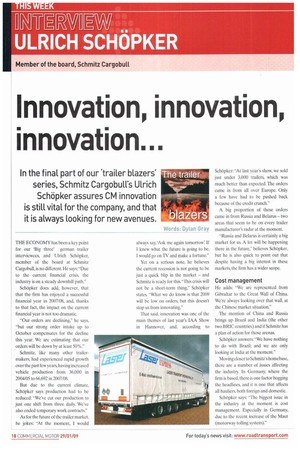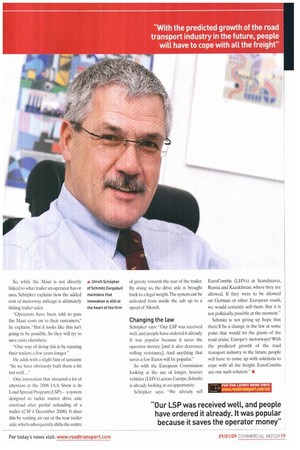Innovation, innovation, innovation...
Page 18

Page 19

If you've noticed an error in this article please click here to report it so we can fix it.
THE ECONOMY has been a key point for our 'Big three' german trailer interviewees, and Ulrich Schapker, member of the board at Schmitz Cargobull, is no different. He says: "Due to the current financial crisis, the industry is on a steady downhill path."
Schiipker does add, however, that that the firm has enjoyed a successful financial year in 2007/08, and, thanks to that fact, the impact on the current financial year is not too dramatic.
"Our orders are declining," he says, "but our strong order intake up to October compensates for the decline this year. We are estimating that our orders will be down by at least 50%."
Schmitz, like many other trailermakers, had experienced rapid growth over the past few years, having increased vehicle production from 36,000 in 2004/05 to 66,692 in 2007/08.
But due to the current climate, Schopker says production had to be reduced: "We've cut our production to just one shift from three daily. We've also ended temporary work contracts."
As for the future of the trailer market, he jokes: "At the moment, I would always say, 'Ask me again tomorrow: If I knew what the future is going to be, I would go on TV and make a fortune," Yet on a serious note, he believes the current recession is not going to be just a quick blip in the market — and Schmitz is ready for this. "This crisis will not be a short-term thing," Schopker states. "What we do know is that 2009 will be low on orders, but this doesn't slop us from innovating."
That said, innovation was one of the main themes of last year's IAA Show in Hannover, and, according to Schopker: "At last year's show, we sold just under 3,000 trailers, which was much better than expected. The orders came in from all over Europe. Only a few have had to be pushed back because of the credit crunch."
A big proportion of these orders came in from Russia and Belarus — two areas that seem to be on every trailer manufacturer's radar at the moment.
"Russia and Belarus is certainly a big market for us. A tot will be happening there in the future," believes Schopker, but he is also quick to point out that despite having a big interest in these markets, the firm has a wider scope.
Cost management
He adds: "We are represented from Gibraltar to the Great Wall of China. We're always looking over that wall, at the Chinese market situation."
The mention of China and Russia brings up Brazil and India (the other two BRIC countries) and if Schmitz has a plan of action for those arenas.
Schopker answers: "We have nothing to do with Brazil; and we are only looking at India at the moment."
Moving closer to Schmitz's homebase, there are a number of issues affecting the industry. In Germany, where the firm is based, there is one factor hogging the headlines, and it is one that affects all hauliers, both foreign and domestic.
SchOpker says: "The biggest issue in the industry at the moment is cost management. Especially in Germany, due to the recent increase of the Maut (motorway tolling system)." So, while the Maut is not directly linked to what trailer an operator has or uses, Schopker explains how the added cost of motorway mileage is ultimately hitting trailer sales, "Operators have been told to pass the Maul costs on to their customers," he explains. "But it looks like this isn't going to be possible. So they will try to save costs elsewhere.
"One way of doing this is by running their trailers a few years longer."
He adds with a slight hint of sarcasm: "So we have obviously built them a bit too well...
One innovation that attracted a lot of attention at the 2008 IAA Show is its Load Spread Program (LSP) — a system designed to tackle tractor drive axle overload after partial unloading of a trailer (CM 4 December 2008). It does this by venting air out of the rear trailer axle, which subsequently shifts the centre of gravity towards the rear of the trailer. By doing so, the drive axle is brought back to a legal weight. The system can he activated from inside the cab up to a speed of 30km/h.
Changing the Law SchOpker says: "Our LSP was received well, and people have ordered it already. It was popular because it saves the operator money [and it also decreases rolling resistance]. And anything that saves a few Euros will be popular," So with the European Commission looking at the use of longer, heavier vehicles (LHVs) across Europe, Schmitz is already looking at an opportunity.
Schupker says: -We already sell EuroCombis (LHVs) in Scandinavia, Russia and Kazakhstan, where they are allowed. If they were to be allowed on German or other European roads, we would certainly sell them. But it is not politically possible at the moment."
Schmitz is not giving up hope that there'll be a change in the law at some point that would let the giants of the road cruise Europe's motorwayeWith the predicted growth of the road transport industry in the future, people will have to come up with solutions to cope with all the freight. EuroCombis are one such solution." •
























































































































































